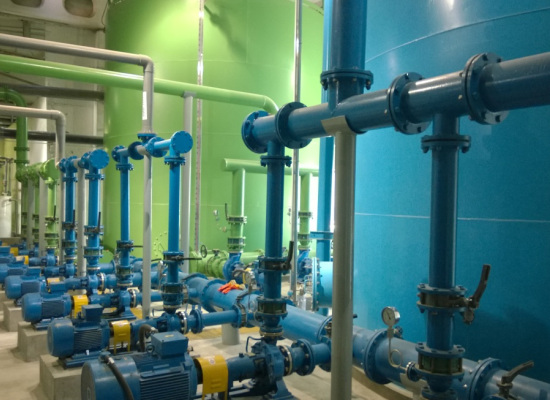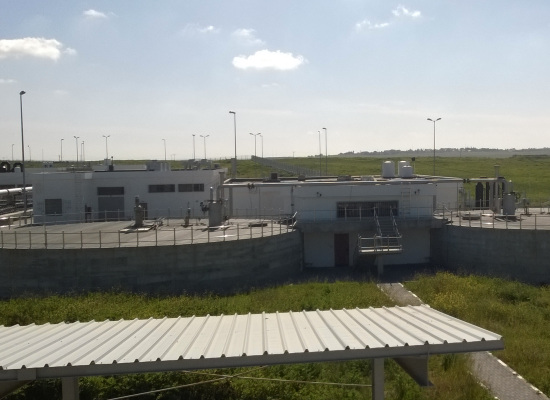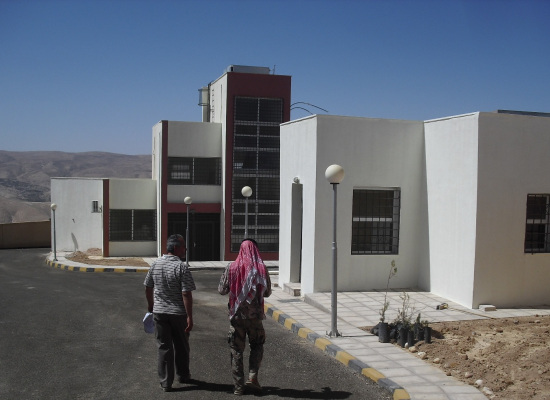Conventional power plants - Project examples
-

Mongolia - Thermal Power Plant #4, Ulaanbaatar (Consulting Services for Modernization and Rehabilitation)
The project encompasses the modernisation and rehabilitation of the Russian design coal-fired Thermal Power Plant # 4 in Ulaanbaatar, which is the largest power plant in Mongolia, supplying electricity and heat to more than one third of the Mongolian population, i.e. approx. 1.1 million people. It generates more than 70% of the electricity for the central energy system. The plant consists of eight coal-fired boilers of 480 t/h that feed six turbines (1 x 80 and 5 x 100 MW). Steam is extracted for district heating and industrial use. The plant runs on middle-grade lignite from the Bangannur and Shivee-Ovoo mines. Project measures should achieve an increase of available capacity by 11.7 MW, a decrease of specific coal consumption and a reduction of the CO2 emissions.
intec's services
- Finalisation of scope and basic design of the project measures
- Preparation and issuance of tender documents/assistance with tender (bid evaluation, contract negotiations) for 3 lots: cooling water cleaning system with filtration, variable speed drives for two boiler feed water pumps and reverse osmosis water treatment plant
- Coordination of project implementation; Check and approval of contractor's drawings and specifications
- Assistance in the coordination and supervision of site activities
- Factory acceptance tests (FAT)
- Check and approval of contractor's invoices
- Assistance in commissioning, including QA/QC procedures, as-built documentation, and maintenance manuals
- Amendment: Cancellation of Lot 2 after bid evaluation and redistribution of equipment to be supplied and associated works; elaboration of new arrangements is ongoing
Client
Thermal Power Plant #4 Co.Financing
Kreditanstalt für Wiederaufbau (KfW)Period of implementation
10.2012 - 12.2015 -

Palestine - Solar PV for the North Gaza Emergency Sewage Treatment Plant
The Palestinian Water Authority (PWA) commissioned Phase 1 of the "North Gaza Emergency Sewage Treatment (NGEST) Project", which requires a total of 12 MW of electric power under full operation conditions. Several potential sources of power supply for the NGEST had been considered, but all of them were discounted for various reasons.
The present study, commissioned by the World Bank in collaboration with PWA and the Palestinian Energy and Natural Resource Authority (PENRA), assessed the feasibility of supplying NGEST with electricity generated from solar power sources.
intec's services
Assessment of life-cycle electrical load of the NGEST plant (max. 12 MW at full operation)
List and review options for power supply to NGEST (on-site diesel generation, additional power supply from Israel through a dedicated feeder, additional supply through expansion of the GPP's capacity - practicability, risks and assessment of levelized costs)
Assessment of the feasibility of solar PV power generation to meet at least part of NGEST's demand, i.e.
- resource availability - collection and interpretation of available data
- back-up power supply / batteries
- local infrastructure issues
- conceptual design and detailed costing
- preliminary environmental and social impact assessment
- economic and financial analysis
- development of an EPC contract format and determination of operation and maintenance requirements
- assessment of the potential impact of the local political environment on the project.
Client
World BankFinancing
World BankPeriod of implementation
12.2014 - 12.2015 -

Regional - FWC BENEF 2013 - Multiple Framework Contract to Recruit Short-term Services - Lot 4
The objective of the FWC was to provide, via individual assignments defined and contracted through Specific Contracts, short-term expertise at very short notice.
The expertise refered to any stage of a project (except financial audits) and covered the following sectors: fossil fuels (oil, gas, coal), hydraulics, renewable energies (solar thermal, PV, hydro, wind, biomass, biofuels, geothermal, wave and marine), power grids (national/regional/cross-border, mini-grids, smart grids), energy services market development, institutional frameworks for energy management, energy sector studies/statistics/indicators, rural electrification, nuclear safety (nuclear power plant operation, operation of non-power generating nuclear or radiological installations, design safety, safeguards, non-proliferation, radio-active waste and its transport, offsite emergency preparedness, decommissioning; training of nuclear regulator and/or operator staff on nuclear safety topics).
The expertise covered any geographic area, within or outside the EU.
intec's services
intec's services were focused on the areas of fossil fuels, power grids, rural electrification and renewable energies.
Client
European CommissionFinancing
European CommissionPeriod of implementation
12.2013 - 12.2015
Mongolia - Thermal Power Plant #4, Ulaanbaatar (Consulting Services for Modernization and Rehabilitation)
The project encompasses the modernisation and rehabilitation of the Russian design coal-fired Thermal Power Plant # 4 in Ulaanbaatar, which is the largest power plant in Mongolia, supplying electricity and heat to more than one third of the Mongolian population, i.e. approx. 1.1 million people. It generates more than 70% of the electricity for the central energy system. The plant consists of eight coal-fired boilers of 480 t/h that feed six turbines (1 x 80 and 5 x 100 MW). Steam is extracted for district heating and industrial use. The plant runs on middle-grade lignite from the Bangannur and Shivee-Ovoo mines. Project measures should achieve an increase of available capacity by 11.7 MW, a decrease of specific coal consumption and a reduction of the CO2 emissions.
intec's services
- Finalisation of scope and basic design of the project measures
- Preparation and issuance of tender documents/assistance with tender (bid evaluation, contract negotiations) for 3 lots: cooling water cleaning system with filtration, variable speed drives for two boiler feed water pumps and reverse osmosis water treatment plant
- Coordination of project implementation; Check and approval of contractor's drawings and specifications
- Assistance in the coordination and supervision of site activities
- Factory acceptance tests (FAT)
- Check and approval of contractor's invoices
- Assistance in commissioning, including QA/QC procedures, as-built documentation, and maintenance manuals
- Amendment: Cancellation of Lot 2 after bid evaluation and redistribution of equipment to be supplied and associated works; elaboration of new arrangements is ongoing
Client
Thermal Power Plant #4 Co.Financing
Kreditanstalt für Wiederaufbau (KfW)Period of implementation
10.2012 - 12.2015Palestine - Solar PV for the North Gaza Emergency Sewage Treatment Plant
The Palestinian Water Authority (PWA) commissioned Phase 1 of the "North Gaza Emergency Sewage Treatment (NGEST) Project", which requires a total of 12 MW of electric power under full operation conditions. Several potential sources of power supply for the NGEST had been considered, but all of them were discounted for various reasons.
The present study, commissioned by the World Bank in collaboration with PWA and the Palestinian Energy and Natural Resource Authority (PENRA), assessed the feasibility of supplying NGEST with electricity generated from solar power sources.
intec's services
Assessment of life-cycle electrical load of the NGEST plant (max. 12 MW at full operation)
List and review options for power supply to NGEST (on-site diesel generation, additional power supply from Israel through a dedicated feeder, additional supply through expansion of the GPP's capacity - practicability, risks and assessment of levelized costs)
Assessment of the feasibility of solar PV power generation to meet at least part of NGEST's demand, i.e.
- resource availability - collection and interpretation of available data
- back-up power supply / batteries
- local infrastructure issues
- conceptual design and detailed costing
- preliminary environmental and social impact assessment
- economic and financial analysis
- development of an EPC contract format and determination of operation and maintenance requirements
- assessment of the potential impact of the local political environment on the project.
Client
World BankFinancing
World BankPeriod of implementation
12.2014 - 12.2015Regional - FWC BENEF 2013 - Multiple Framework Contract to Recruit Short-term Services - Lot 4
The objective of the FWC was to provide, via individual assignments defined and contracted through Specific Contracts, short-term expertise at very short notice.
The expertise refered to any stage of a project (except financial audits) and covered the following sectors: fossil fuels (oil, gas, coal), hydraulics, renewable energies (solar thermal, PV, hydro, wind, biomass, biofuels, geothermal, wave and marine), power grids (national/regional/cross-border, mini-grids, smart grids), energy services market development, institutional frameworks for energy management, energy sector studies/statistics/indicators, rural electrification, nuclear safety (nuclear power plant operation, operation of non-power generating nuclear or radiological installations, design safety, safeguards, non-proliferation, radio-active waste and its transport, offsite emergency preparedness, decommissioning; training of nuclear regulator and/or operator staff on nuclear safety topics).
The expertise covered any geographic area, within or outside the EU.
intec's services
intec's services were focused on the areas of fossil fuels, power grids, rural electrification and renewable energies.






